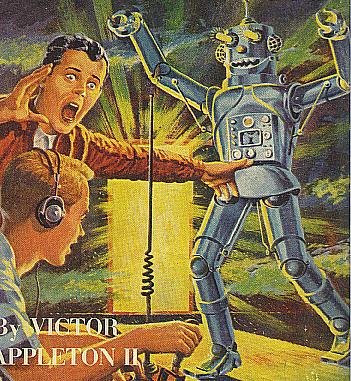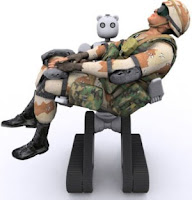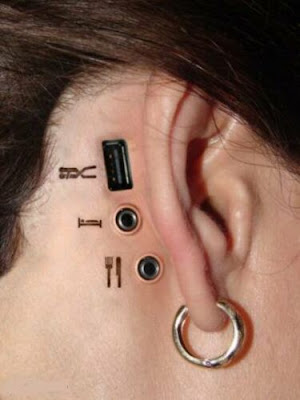 They say people are more afraid of speaking in public than of dying. But could you imagine dying while speaking in public?
They say people are more afraid of speaking in public than of dying. But could you imagine dying while speaking in public?Now that I've terrorized your soul with the most nightmarish concept imaginable, let's talk about the inevitability of robots taking control of your free will which, relatively speaking, should scare you only as much as our nation is of peak oil - little to none.
[Full disclosure: The Author is a self-proclaimed nerdbomber. His favorite abstractly shaped hard candy is Nerds and he enjoys the alt-hip-hop stylings of N.E.R.D. The following comes fresh from the nerdery.]
So I watched three hours of The Science Channel last night including Where's My Robot, The Day of the Cyborg and Robosapiens. There's good news and bad news. We will almost definitely be overtaken by robots and completely lose touch of what we call humanity. But now the bad news - it's probably going to take another fifty to a hundred years. Will you live to see it? Probably not. For that, you can only blame your parents for conceiving you in the latter half of the twentieth century and not, disgustingly, twenty or so years from now.
 There are two seemingly convergent paths down which the human-machine dynamo is currently hurtling. The first is the man-made development of robots - nuts and bolts, circuits, optics, maybe a hat - that are being created to emulate humans in both behavior and appearance. Picture Johnny-Five from Short Circuit, or WALL-E from WALL-E. These are physical entities only - mindless, and only as intelligent as the human-instilled programming inside it. Actually WALL-E was sentient, so forget him. On second thought so was Johnny-Five. Man, Hollywood is really screwing with our heads. Okay, picture Keanu Reeves - now there's an inanimate object that clearly lacks any cognition whatsoever.
There are two seemingly convergent paths down which the human-machine dynamo is currently hurtling. The first is the man-made development of robots - nuts and bolts, circuits, optics, maybe a hat - that are being created to emulate humans in both behavior and appearance. Picture Johnny-Five from Short Circuit, or WALL-E from WALL-E. These are physical entities only - mindless, and only as intelligent as the human-instilled programming inside it. Actually WALL-E was sentient, so forget him. On second thought so was Johnny-Five. Man, Hollywood is really screwing with our heads. Okay, picture Keanu Reeves - now there's an inanimate object that clearly lacks any cognition whatsoever.Why are we building robots, and specifically why are we building them to look
 like us? The answer is two-pronged - we're lazy, and we can. Remember the dude who invented the wheel? That lazy sunnova B was tired of lugging the kills from his hunt over his shoulder. When he showed up the next day with a wheelbarrow, he got more looks than a popped collar at a [insert any social event in any culture since the beginning of time]. But once the benefit was understood, all the other cave-gentlemen realized that Ug was on to something - maybe we can manipulate the world around us to serve our needs. Ug was positively slaughtered in a wheelbarrow robbery that went horribly and precisely according to plan.
like us? The answer is two-pronged - we're lazy, and we can. Remember the dude who invented the wheel? That lazy sunnova B was tired of lugging the kills from his hunt over his shoulder. When he showed up the next day with a wheelbarrow, he got more looks than a popped collar at a [insert any social event in any culture since the beginning of time]. But once the benefit was understood, all the other cave-gentlemen realized that Ug was on to something - maybe we can manipulate the world around us to serve our needs. Ug was positively slaughtered in a wheelbarrow robbery that went horribly and precisely according to plan.The wheel was the forerunner to any machine that followed, and all the machines we can think of - a water-powered windmill, the blender in your kitchen, even the keyboard at which I'm now tapping - are the forerunners of robotics. No matter how specialized the function they perform (think refrigerator), we as humans expend less energy to accomplish an end result than we would if that machine didn't exist. And so we perpetually seek to build better and more capable automata. Are we lazy? Or did evolution bless us with the aptitude to devise methods that enhance our quality of life? The answer is yes.
Why then must Rosie the Robot resemble the rotund if reliable au pair she does? Why can she
 not merely be a monolithic cube on wheels? Because you don't want her to be. Trials of robotic servants over the years conclude that we want our bionic butlers to be recognizably us-like. We want a "face" with "eyes" we can peer into. If our robot was a blank surface of steel, upon what would our gaze fall when we tell it to scrub the tub that I was seriously going to do myself but I've just been so busy with - what's that? I have a phone call?
not merely be a monolithic cube on wheels? Because you don't want her to be. Trials of robotic servants over the years conclude that we want our bionic butlers to be recognizably us-like. We want a "face" with "eyes" we can peer into. If our robot was a blank surface of steel, upon what would our gaze fall when we tell it to scrub the tub that I was seriously going to do myself but I've just been so busy with - what's that? I have a phone call?But there's a problem with the pure robot lineage - it will never develop the on-the-fly decision-making skills we as humans are expert at. As advanced as we may mold them to be, our robotic friends just can't find the je ne sais qaui of what it really means to be "alive". Didn't know this was a multi-lingual blog, didja? Well it es. And it's all for the best - should our mechanical nanny ("mechanny" - shotgun!) be as conscious and animated as you and I? Remember: there are unalienable rights that go hand-in-hand with life. Would WALL-E get to vote? Would WALL-E be taxed? When WALL-E ceases to function, would we bury him next to Grandpa?
But there's an alternative lineage, and while it mostly spares us from such ethical concerns, it throws us Neo-deep into a warped sci-fi reality we can barely grasp. So let's start small - your dog has a chip in it. When it runs away and is taken to the local vet, he scans it, and learns the rightful owner. Fido is a cyborg. He's a whole lot of biological organism, and a leeeetle bit machine. Your kids will be likewise. Take the Big Brother aspect out of it for a moment - such human-machine hybrids will be more common and more machine as new technologies are perfected. And why can we just cast the 1984ishness aside? Because whether or not our government could benefit from such endeavors, there are "upgrades" we as individuals will both want and need.

Dude loses his arm in a tragic workplace-fatigue competition. Scientists can now link an electrode to the nerve endings at stump's end, and by thought alone, dude can send impulses from brain to nerves to electrode to electrical signals that will accordingly command mechanical systems. Simply put, dude can control a machine with his mind. Similarly, real-life examples of amplified and clarified sound input ("super-hearing") and enhanced digitized visual information ("super-vision") that connect the outside world with our inner thoughts are just over the horizon. Like just over.
It's freakin' weird.
 Take it a little further. Your organs are no more "alive" than your computer mouse. As such, we can rebuild organs - bladders, lungs, and one day even hearts - and you'll take one step further toward being truly superhuman. The latest and greatest tool in our technology toolbag is nanoscience. Soon we'll be able to control the universe at the nanoscale level, leaving virtually no barrier to what can be done in your body. The more synthetic our "parts" become, the blurrier the line between human and machine becomes. But as we'll never relinquish that one thing that science can't yet put its finger on - call it a spirit, a soul, or a life force - our descendants' superhuman bodies will still retain their humanity.
Take it a little further. Your organs are no more "alive" than your computer mouse. As such, we can rebuild organs - bladders, lungs, and one day even hearts - and you'll take one step further toward being truly superhuman. The latest and greatest tool in our technology toolbag is nanoscience. Soon we'll be able to control the universe at the nanoscale level, leaving virtually no barrier to what can be done in your body. The more synthetic our "parts" become, the blurrier the line between human and machine becomes. But as we'll never relinquish that one thing that science can't yet put its finger on - call it a spirit, a soul, or a life force - our descendants' superhuman bodies will still retain their humanity.Now, do you want to buy this weed from me or not?



No comments:
Post a Comment